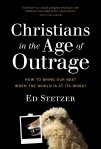Google the word “outrage,” and this definition appears: “an extremely strong reaction of anger, shock, or indignation.” Not just anger, shock or indignation, mind you, but an “extremely strong reaction” of those things. Outrage is anger kicked up to 11.
Contemporary Americans live in the Age of Outrage. We are outraged by what those on the “other side” of just about any political, cultural or religious issue say and do, and we take to social media to “destroy” them. Not dialogue civilly, let alone rebut or refute, but destroy.
Outrage destroys.
In Christians in the Age of Outrage, Ed Stetzer shows “how to bring our best when the world is at its worst,” as the subtitle puts it. The book is a tract for our times, and its author is the right person to share it. Stetzer holds the Billy Graham Distinguished Chair of Church, Mission, and Evangelism at Wheaton College. Like Graham — known to many as “America’s Pastor” — Stetzer wants American evangelicals to be “unifying forces in American life,” bringing people together around the gospel. The purpose of his book is “to help Christians move from contributing to the age of outrage to effectively engaging it with the gospel.”
To accomplish that purpose, Stetzer looks at three broad topics. In Part 1, he examines “the two primary catalysts for our outrage”: “cultural forking” and “the technology discipleship gap.” Whereas American culture used to be nominally Christian, so that evangelicals found themselves in its mainstream, it is increasingly becoming post-Christian. Culture forked, in other words, and evangelicals now find themselves outside the mainstream. The new mainstream and the old mainstream eye each other distrustfully across the gap that divides them.
Social media exacerbates that distrust. Face-to-face encounters usually keep things civil, but online, you can abstract your opponents’ ideas from the totality of their lives and then reduce them to that abstraction. Social media use too often succeeds in reducing people to straw men and then providing the match to light those straw men on fire. This results in a vicious cycle of caricature, outrage, counter-caricature, counter-outrage, and so on and so forth.
In Part 2, Stetzer examines “four lies that reinforce and deepen our world’s anger.” They are:
- Christians are the worst!
- My outrage is righteous anger.
- _____ will save me from the outrage!
- Mission is optional.
Some of these are lies that post-Christian America tells about Christian America. The others are lies Christians tell themselves. These lies distort clear thinking and rationalize bad behavior.
Stetzer’s debunking of each of these lies is good, but I especially appreciated the distinction he drew between “righteous anger” and “outrage.” He writes:
Outrage exhibits few if any of the short- or long-term characteristics Scripture associates with righteous anger. Righteous anger is aimed at the glory of God,, but outrage is an angry reaction to personal injury or insult. Where righteous anger is purposeful and designed to advance specific objectives and ends, outrage exhibits little critical thought as to its underlying focus, motivations, expressions, or ends.
Outrage is motivated by a desire to punish or destroy rather than reconcile or refine. It is frequently accompanied by hubris and a confidence in its judgment, categorically rejecting any nuance. Outrage is fast and decisive rather than reflective, choosing to exhibit God’s retribution rather than reflect his persistent, steadfast love.
Yes, there are any number of sins and injustices in the world to be righteously angry about. Stetzer’s not denying this. But in the Bible, righteous anger is the prelude to repentance, reform and redemption. It is a means to a greater end. In our culture, outrage is its own reward.
The connection between righteous anger and redemption reminds us that God’s mission to redeem humanity is the purpose for which Christ came into the world. “For the Son of Man came to seek and save the lost” (Luke 19:10). When we let our anger get kicked up to 11, we forget that we are Christ’s ambassadors, carrying the message: “Be reconciled to God” (2 Corinthians 5:20). When we keep our mission in the forefront of our minds, however, a different strategy emerges.
Part 3 outlines “ways that Christians can counteract the outrage in their lives and this world by being intentional about developing a Christ-centered worldview, living as God’s ambassadors, loving others in a winsome way, and engaging thoughtfully with others, both online and face-to-face.” I like the way Stetzer summarizes the strategy this way: “Instead of Outrage, Engage.”
There’s so much wisdom in Stetzer’s recommendations that it’s hard to summarize them all. So, let me just highlight his “Principles of Digital Discipleship.” They are particularly helpful, especially given the outsized role that social media play in fomenting our culture of outrage. When online, Stetzer advises:
- Remember that everyone is watching.
- Choose investment over consumption.
- See people, not avatars.
- Make grace the default mode.
- Resist the urge to fight every battle.
- Value authority over freedom.
Regarding that last point, Stetzer writes: “Just because we cansay something doesn’t mean we should. There are ways of confronting abuses of power, and I am certainly not condoning a mindless obedience. But Christians need to understand that the best place for difficult conversations is usually not online.”
The vicious cycle of outrage and counter-outrage has got to stop, for the good of our culture and for the sake of the gospel. Christians need to demonstrate a better way. After all, if the Church is “the hermeneutic of the gospel,” as Lesslie Newbigin put it, then our unrighteous outrage may lead people away from God, giving Him a bad reputation in the process. You can be outraged or you can fulfill the Great Commission. You can’t do both.
In sum, I highly recommend both Christians in the Age of Outrage and its author. If you’d like to see how he deals online with controversial issues in a Christian manner, follow @EdStetzer on major social media. Or check out his blog at ChristianityToday.com.
 Book Reviewed
Book Reviewed
Ed Stetzer, Christians in the Age of Outrage: How to Bring Our Best When the World Is At Its Worst (Carol Stream, IL: Tyndale Momentum, 2018).
P.S. If my review helped you form an opinion of this book, please click “Helpful” on my Amazon review page.
P.P.S. This review is cross-posted from InfluenceMagazine.com with permission.

